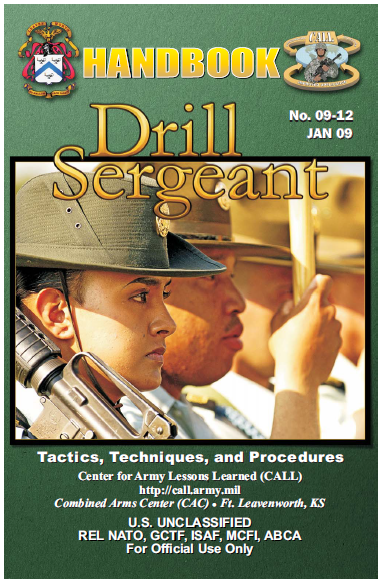CENTER FOR ARMY LESSONS LEARNED DRILL SERGEANT HANDBOOK
- 60 pages
- For Official Use Only
- January 2009
Being a drill sergeant may be the most challenging and rewarding assignment a noncommissioned officer will ever experience during his military career. While training initial entry Soldiers to fight and win in today’s Global War on Terrorism, drill sergeants must embody and reflect the Army’s values and standards. They must also be:
• Effective communicators.
• Sound administrators.
• Motivators.
• Proficient instructors.
• Effective coaches, mentors, and counselors.This handbook is designed to help new drill sergeants conquer the many challenges of their assignment and succeed in their mission of training Soldiers.
…
Common sense techniques:
• Understand that training support packages (TSPs) are guidelines and might not always relate to current situations. Use your personal experiences, paint a picture or visual, and make training realistic.
• “Smoking” the Soldiers is not always the right answer. A firm talk, having the Soldier write an essay, taking away a privilege, even getting a parent on the phone might be more effective. Seek clear guidance from your chain of command first.
• Know when to raise your voice to make a point. Do not be someone who is always screaming, because the Soldiers will tune you out. “When in doubt, don’t scream or shout!” Be direct and clear without yelling or
using profanity—take the high road.
• Know the difference between being strict/enforcing standards and being abusive/demeaning. Strict drill sergeants motivate Soldiers; demeaning drill sergeants shut Soldiers down.
• Every unit has that one drill sergeant who is just one mistake away from being relieved. Do not fall for it just because he is getting away with something. It is not okay for you to do it.
• When a Soldier compromises the Army Values, use one of the Army’s outstanding Soldier stories (such as SFC Smith who was awarded the Iraqi War Congressional Medal of Honor) to inspire him.
• Challenge the Soldiers with nightly assignments from their smart book or the Skill Level I Common Tasks Manual. The assignments can be based on upcoming training. Use drill sergeant time to educate and quiz the Soldiers. Demonstrate how they can put their basic knowledge to use. This technique is very effective, and the Soldiers are usually excited about learning.
• Print and put additional FMs into binders for use at the field training exercise. Have the Soldiers teach from the manuals with your supervision. It gives them a chance to get in front of their peers and show what they have learned. Many of them are very good at it—they just need a little support and confidence.
• Demonstrate everything you can—obstacle courses, first aid, land navigation, and so forth. Show Soldiers that you are a master of these tasks and can perform them yourself. Your are not just talk—you are a Soldier too!
• Talk to your Soldiers about your experiences in the Army, especially in combat. Fear of the unknown is always a demotivator.
• Maintain and account for all equipment. Check and re-check your hand receipts. Assign Soldiers to assist to build leadership/accountability.
• Conduct an inventory after all major training events, end of cycle, or when any equipment is turned in. Develop an equipment smart book for hand receipts, inventories, and statements of charges; and keep it updated.
• Keep a leader’s book that includes pertinent information on all of your Soldiers (hot/cold weather injuries, medical profiles, mandatory release dates, etc.).
• Always focus on bay area security. Ensure your Soldiers know how to secure their personal items properly. Let them know they should report any missing or stolen property to you immediately.
• Be cognizant of your unit’s hazardous material requirements. Ensure all hazardous material is stored properly in accordance with Army and installation policies, regulations, or guidance.
• You may encounter Soldiers going through various life changes or emotions such as homesickness, withdrawal from certain medications, anxiety, depression, anger, fear, or resistance to discipline. Seek clear guidance from your chain of command immediately on how to handle these challenges.
• Become familiar with the Community Mental Health Services (CMHS) process. Get your chain of command involved to ensure Soldiers get proper treatment or counseling.
• Deal with disciplinary issues up front. Do not let the Soldiers talk back to you—correct them on the spot! This sends a message to the other Soldiers that this behavior will not be tolerated.
• Make all instructions easy to understand. Link Soldiers who are struggling to comprehend with a buddy who can help them. Follow up with these Soldiers after the training is complete. If possible, match your stronger Soldiers with your weaker Soldiers for successful buddy teams.
• Conduct a check on learning after each training session. Make sure you ask the Soldiers specific questions. If you ask yes or no questions (such as “Do you understand?”), the Soldiers will automatically respond with “Yes, Drill Sergeant!” (whether they understand or not).
• Do not let the Soldiers give up or quit on a task or event. Push and challenge them to meet the training standard while focusing on precision. Have patience; do not sacrifice standards to time.
• Decide early with your battle buddy who will be the primary trainer and then focus on your responsibilities.

